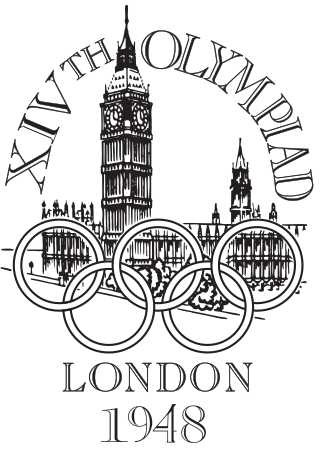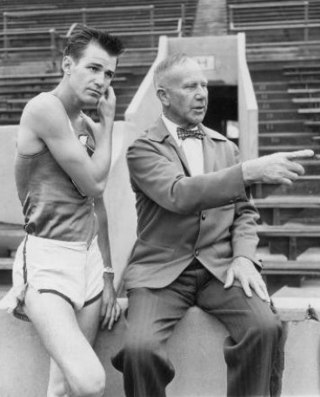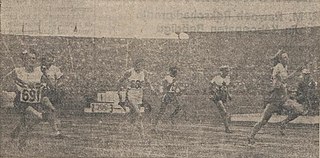
The 1948 Summer Olympics were an international multi-sport event held from 29 July to 14 August 1948 in London, United Kingdom. Following a twelve-year hiatus caused by the outbreak of World War II, these were the first Summer Olympics held since the 1936 Games in Berlin. The 1940 Olympic Games had been scheduled for Tokyo and then for Helsinki, while the 1944 Olympic Games had been provisionally planned for London. This was the second time London hosted the Olympic Games, having previously hosted them in 1908, forty years earlier. The Olympics would return again to London 64 years later in 2012, making London the first city to host the games three times, and the only such city until Paris and Los Angeles host their third games in 2024 and 2028, respectively. The 1948 Olympic Games were also the first of two summer Games held under the IOC presidency of Sigfrid Edström.

Finland competed at the 1948 Summer Olympics in London, England. 129 competitors, 123 men and 6 women, took part in 84 events in 16 sports. As the country hosted the next Olympics in Helsinki, a Finnish segment was performed at the closing ceremony.
The men's 100 metres sprint event at the 1948 Olympic Games in London, England, we held at Wembley Stadium on 30 and 31 July. Sixty-three athletes from 33 nations competed; each nation was limited to 3 runners by rules set at the 1930 Olympic Congress. The final was won by American Harrison Dillard, in a photo finish. Lloyd LaBeach of Panama won his nation's first medal in the men's 100 metres, a bronze. This was the first time a photo finish camera was used at an Olympic Games. The photo finish equipment consisted of a photoelectric cell, called the Magic Eye, produced by Swiss watchmaker Omega and a slit photography camera produced by the British Race Finish Recording Company.

The men's 200 metres sprint event at the 1948 Summer Olympics took place between 2 August and 3 August. There were 51 competitors from 28 nations. The maximum number of athletes per nation had been set at 3 since the 1930 Olympic Congress. The final was won by American Mel Patton. His countryman Barney Ewell earned silver, making this the third consecutive Games the United States took the top two spots in the event. Lloyd La Beach's bronze gave Panama a medal in its debut in the event.

The men's 400 metres sprint event at the 1948 Olympic Games took place between August 4 and August 5. Fifty-three athletes from 28 nations competed. The maximum number of athletes per nation had been set at 3 since the 1930 Olympic Congress. The final was won by Jamaican Arthur Wint coming from almost 10 meters back to catch teammate and world record holder Herb McKenley. This was Jamaica's first Olympic gold medal in any event, and broke a string of 3 straight American victories in the men's 400 metres.

The men's 800 metres event at the 1948 Olympic Games took place July 30, July 31 and August 2. Forty-one athletes from 24 nations competed. The maximum number of athletes per nation had been set at 3 since the 1930 Olympic Congress. The final was won by the American Mal Whitfield. It was the first of Whitfield's two wins in the event, the second of four consecutive American victories, and the fifth overall United States win in the 800 metres. Arthur Wint earned Jamaica's first Olympic medal in any event with silver; he would take gold in the 400 metres a few days later. Marcel Hansenne took France's first 800 metres medal with bronze.

The men's 1500 metres event at the 1948 Olympic Games took place August 4 and August 6. Thirty-six athletes from 22 nations competed. The maximum number of athletes per nation had been set at 3 since the 1930 Olympic Congress. The final was won by Swede Henry Eriksson. It was Sweden's first medal in the 1500 metres; Lennart Strand took Sweden's second medal 0.6 seconds later. Willem Slijkhuis earned bronze, with the Netherlands also receiving its first medal in the 1500 metres.
The men's 10,000 metres event at the 1948 Olympic Games took place July 30. The final was won by Emil Zátopek of Czechoslovakia.

The men's 110 metres hurdles event at the 1948 Summer Olympic Games took place on 3 and 4 August. Twenty-eight athletes from 18 nations competed. The maximum number of athletes per nation had been set at 3 since the 1930 Olympic Congress. The final was won by American William Porter. Porter's compatriots, Clyde Scott and Craig Dixon took 2nd and 3rd place. It was the third of nine consecutive American victories, and the ninth overall gold medal for the United States in the 110 metres hurdles. It was also the first of four consecutive American podium sweeps, and the fifth overall sweep by the United States in the event.

The men's 400 metres hurdles event at the 1948 Summer Olympic Games took place July 30 and July 31. There were 25 competitors from 17 nations. The maximum number of athletes per nation had been set at 3 since the 1930 Olympic Congress. The final was won by American Roy Cochran. It was the nation's second consecutive and seventh overall victory in the event. Duncan White won Ceylon's first Olympic medal in any event with his silver. As of the 2016 Games, it remains the only medal won by a male competitor from Ceylon/Sri Lanka; the nation has won one other medal, Susanthika Jayasinghe's silver in the 2000 women's 200 metres. Sweden's first medal in the men's 400 metres hurdles was won by Rune Larsson, taking bronze.

The men's 3000 metres steeplechase event at the 1948 Summer Olympic Games took place on 3 and 5 August. The final was won by Swede Tore Sjöstrand. Sjöstrand's compatriots, Erik Elmsäter and Göte Hagström took 2nd and 3rd place.
The men's 4 × 100 metres relay event at the 1948 Olympic Games took place on August 6 & August 7. The United States team won the final, but was initially disqualified when officials thought the pass between Barney Ewell and Lorenzo Wright had taken place outside the zone. After further review, officials saw that the pass took place inside the zone, and restored U.S. results.
The men's 4 × 400 metres relay event at the 1948 Olympic Games took place on 6 and 7 August. The United States team won the final with a time of 3:10.4.

The men's 10 kilometres walk event at the 1948 Summer Olympic Games took place from 3 to 7 August. The final was won by Swede John Mikaelsson. This was the first time since 1924 the event took place.

The men's high jump event was part of the track and field athletics programme at the 1948 Summer Olympics. The competition was held on July 30, 1948. Twenty-seven athletes from 16 nations competed. The maximum number of athletes per nation had been set at 3 since the 1930 Olympic Congress. The final was won by John Winter of Australia. It was Australia's first victory in the men's high jump, and only the second time a jumper from outside the United States had won. Bjorn Paulson earned Norway's first medal in the event with a silver. George Stanich took bronze, keeping alive the United States' streak of medaling in every edition of the men's high jump.

The women's 100 metres sprint event at the 1948 Olympic Games took place July 31 and August 2. The final was won by Dutchwoman Fanny Blankers-Koen.
The women's 200 metres sprint event at the 1948 Olympic Games took place on August 5 and August 6. The final was won by Dutch athlete Fanny Blankers-Koen. It was the first time this event was included in the Summer Olympics.

The men's marathon event at the 1948 Summer Olympic Games took place on August 7. Forty-one athletes from 21 nations competed. The maximum number of athletes per nation had been set at 3 since the 1930 Olympic Congress. The race was won by Delfo Cabrera of Argentina, the nation's second victory in three Games. Tom Richards's silver medal put Great Britain on the podium for the third time in a row, while Étienne Gailly earned Belgium's first marathon medal with his bronze.
The women's 80 metres hurdles event at the 1948 Summer Olympic Games took place on 3 and 4 August. The final was won by Dutch athlete Fanny Blankers-Koen.
The women's 4 × 100 metres relay event at the 1948 Olympic Games took place on August 7. The Dutch team won with a time of 47.5.














